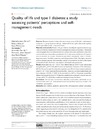Identificador persistente para citar o vincular este elemento:
https://accedacris.ulpgc.es/jspui/handle/10553/47595
| Título: | Quality of life and type 1 diabetes: a study assessing patients' perceptions and self-management needs | Autores/as: | Alvarado-Martel, Dácil Velasco, Rebeca Sánchez-Hernández, Rosa M. Carrillo, Armando Novoa, Francisco J. Wägner, Ana María |
Clasificación UNESCO: | 32 Ciencias médicas 320502 Endocrinología 3212 Salud pública |
Palabras clave: | Type 1 Diabetes Qualitative Quality of Life Self-Management Patients' Perceptions |
Fecha de publicación: | 2015 | Publicación seriada: | Patient Preference and Adherence | Resumen: | Purpose: The main objective of this study was to assess quality of life (QoL) and treatment satisfaction in a group of patients with type 1 diabetes (T1D) and explore their needs regarding and their perception of QoL living with diabetes.Materials and methods: Patients with type 1 diabetes attending the outpatient endocrinology clinics of a reference hospital were invited to participate in a cross-sectional study. Clinical and sociodemographic data were obtained (interview and clinical records), and diabetes-related QoL was assessed using a standardized questionnaire. In 67 participants, satisfaction with treatment was also assessed, and an open interview was performed, assessing the impact of diabetes, long-term worries, flexibility, restrictions, and self-perception of QoL. Descriptive statistical analysis, bivariate analysis, and multivariate analysis were performed in order to find factors associated with QoL. Interviews were analyzed and summarized questionwise.Results: Mean patient age was 31.4 +/- 11.6 years, diabetes duration 14.2 +/- 9.3 years, and glycated hemoglobin (HbA(1c)) 8.5%+/- 1.9% (69 +/- 20.8 mmol/mol International Federation of Clinical Chemistry [IFCC]). The questionnaires showed good average QoL scores (94.6+22.9) and treatment satisfaction scores (25.7 +/- 6.7). QoL worsened with increasing HbA(1c), female sex, severity of complications, and lower education (r(2)=0.283, P<0.005). In the open interview, 68.5% of the patients reported that diabetes had changed their lives, 83.5% identified complications as their most important long-term concern, and 59.7% said that they needed more training to manage the disease.Conclusion: Poor glycemic control, lower education, complications, and female sex are associated with worse QoL. Semi-structured interviews identified aspects not included in the standardized questionnaires. | URI: | https://accedacris.ulpgc.es/handle/10553/47595 | ISSN: | 1177-889X | DOI: | 10.2147/PPA.S87310 | Fuente: | Patient Preference and Adherence [EISSN 1177-889X], v. 9, p. 1315-1323, (Septiembre 2015) |
| Colección: | Artículos |
Citas SCOPUSTM
40
actualizado el 08-jun-2025
Citas de WEB OF SCIENCETM
Citations
40
actualizado el 08-feb-2026
Visitas
85
actualizado el 10-ene-2026
Descargas
124
actualizado el 10-ene-2026
Google ScholarTM
Verifica
Altmetric
Comparte
Exporta metadatos
Los elementos en ULPGC accedaCRIS están protegidos por derechos de autor con todos los derechos reservados, a menos que se indique lo contrario.
